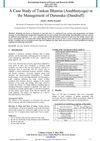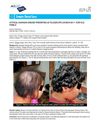 10 citations,
October 2015 in “Journal of the International Association of Providers of AIDS Care”
10 citations,
October 2015 in “Journal of the International Association of Providers of AIDS Care” A woman with HIV had a severe skin condition that improved with antiretroviral therapy.
 10 citations,
June 2007 in “Journal of Oral and Maxillofacial Surgery”
10 citations,
June 2007 in “Journal of Oral and Maxillofacial Surgery” A man's rare tumor caused unusual nerve-related symptoms that improved after surgery.
7 citations,
February 2019 in “Veterinary medicine and science” An American Bully with a genetic skin condition improved significantly with specific topical treatments.
 4 citations,
March 2013 in “Neuropsychiatric Disease and Treatment”
4 citations,
March 2013 in “Neuropsychiatric Disease and Treatment” A woman with anorexia and Cushing's syndrome improved after tumor removal, highlighting the need to consider hormonal issues in psychiatric conditions.
 2 citations,
March 2023 in “Frontiers in medicine”
2 citations,
March 2023 in “Frontiers in medicine” A 15-year-old boy's severe scalp condition improved significantly with adalimumab and baricitinib treatment.
 2 citations,
January 2014 in “Archives of Aesthetic Plastic Surgery”
2 citations,
January 2014 in “Archives of Aesthetic Plastic Surgery” The procedure effectively created natural-looking hairlines and improved facial balance in female patients.
 2 citations,
August 2011 in “Revista Medica De Chile”
2 citations,
August 2011 in “Revista Medica De Chile” A postmenopausal woman's high testosterone levels and symptoms improved after removing a tumor from her ovary.
 1 citations,
July 2022 in “Case reports in endocrinology”
1 citations,
July 2022 in “Case reports in endocrinology” A 70-year-old woman with a malignant adrenal tumor improved after surgery and radiotherapy.
 1 citations,
November 2018 in “Elsevier eBooks”
1 citations,
November 2018 in “Elsevier eBooks” The document concludes that transplantology has evolved with improved techniques and materials, making transplants more successful and expanding the types of transplants possible.
 1 citations,
October 2018 in “Madridge journal of dermatology & research”
1 citations,
October 2018 in “Madridge journal of dermatology & research” A young child with alopecia areata and psoriasis improved with treatment, suggesting a link between the two conditions.
 May 2024 in “International Journal of Science and Research (IJSR)”
May 2024 in “International Journal of Science and Research (IJSR)” Tankan Bhasma mixed with coconut oil effectively reduced dandruff and improved scalp health.
 February 2024 in “Journal of ayurveda and integrated medical sciences”
February 2024 in “Journal of ayurveda and integrated medical sciences” Ayurvedic medicine helped increase a young woman's hemoglobin levels and improved her anemia symptoms.
 September 2023 in “Clinical, cosmetic and investigational dermatology”
September 2023 in “Clinical, cosmetic and investigational dermatology” A patient with a rare form of lupus improved after treatment for skin ulcers and hair loss on the face and scalp.
May 2023 in “MQRInvestigar” A young dog with an enlarged prostate and cysts improved significantly after treatment and surgery.
 May 2023 in “Frontiers in veterinary science”
May 2023 in “Frontiers in veterinary science” A young tapir with a rare skin condition improved after treatment with wound cleaning, cream, and oral medication.
 November 2022 in “Journal of the Endocrine Society”
November 2022 in “Journal of the Endocrine Society” A 13-year-old girl's masculine symptoms improved after surgery for a rare adrenal tumor that produced male hormones.
 October 2022 in “Veterinária notícias/Veterinária Notícias”
October 2022 in “Veterinária notícias/Veterinária Notícias” A 5-year-old Akita with a rare skin condition improved significantly after treatment.
August 2021 in “Indian dermatology online journal” A young boy with a rare skin and nail condition improved significantly with simple topical treatments.
June 2021 in “Current developments in nutrition” The LustrivaTM BH-002 supplement and hair serum improved women's hair, skin, and nail health and appearance.
May 2021 in “Indian journal of forensic medicine and toxicology” Two patients with heart issues had successful surgeries and improved symptoms.
April 2020 in “Journal of the Endocrine Society” Taking thyroid medication reduced the patient's pituitary gland swelling and improved her symptoms.
 9 citations,
May 2001 in “Journal of the American Veterinary Medical Association”
9 citations,
May 2001 in “Journal of the American Veterinary Medical Association” A cat's hyperactivity and hair loss were caused by eating valproic acid but improved after stopping access to the drug.
 6 citations,
April 2014 in “European journal of medicinal chemistry”
6 citations,
April 2014 in “European journal of medicinal chemistry” New compounds similar to cromakalim were less effective at inhibiting insulin release but improved in solubility and one acted as a calcium entry blocker, not a potassium channel opener.
 5 citations,
September 2011 in “Journal of the American Academy of Dermatology”
5 citations,
September 2011 in “Journal of the American Academy of Dermatology” A patient's skin eruption was caused by the cancer drug cyclophosphamide and improved after stopping the drug.
 3 citations,
July 2015 in “Australasian Journal of Dermatology”
3 citations,
July 2015 in “Australasian Journal of Dermatology” A man developed an allergic skin reaction to a rosacea treatment and improved after stopping the medication and receiving allergy-specific care.
 1 citations,
August 2021 in “Movement disorders clinical practice”
1 citations,
August 2021 in “Movement disorders clinical practice” A man with Isaac's syndrome affecting only one side of his body improved after immune system-targeted treatment.

Attractive women slightly worsened mood, green backgrounds improved mood, and older people had better moods.
 May 2021 in “Journal of the American College of Cardiology”
May 2021 in “Journal of the American College of Cardiology” An 11-year-old girl with Kawasaki disease experienced hair loss that improved after treatment.
 November 2017 in “Pediatrics in Review”
November 2017 in “Pediatrics in Review” A 4-year-old girl with hair loss was diagnosed with early-onset trichotillomania and improved with behavioral interventions.
 72 citations,
December 2012 in “Expert Opinion on Drug Delivery”
72 citations,
December 2012 in “Expert Opinion on Drug Delivery” Niosomes are promising for skin drug delivery, offering benefits like improved drug penetration and stability.
























